121019_YKMV_A8.pdf



December 10, 2019 • Page 8
shop online at www.missourivalleyshopper.com
The Plots Thicken
Pollinator Plots Continue At Lewis & Clark Recreation Area
BY BRENDA K. JOHNSON
P&D Correspondent
Projects built on good
ideas come and go all the
time in the workplace.
That’s how the busy,
changing-priority world
goes. The process of creating plots of wildflowers
and native grasses at the
entrance area of Lewis
& Clark Recreation Area
started in 2014. Five years
later, the project continues.
Shane Bertsch, District
Park Supervisor at Lewis
& Clark Recreation Area
and Dale Dawson, Conservation Foreman, devised
the concept of wildflower
and native grass pollinator
plots at the park entrance.
Large, contoured plots that
total about three acres are
positioned on either side of
the park entrance road for
visitors. Blooms show from
the highway. They designed
the plots to benefit pollinators as well as contribute
a natural element to the
manicured park. The project had financial support
from Yankton Area Pheasants Forever organization
and advice from Millborn
Seeds in Brookings.
Bertsch and Dawson
have shown perseverance
through cool springs and
years of excessive moisture that favor aggressive
weeds over native grasses.
Five years in, they recall
high school youth taking
senior pictures among the
wildflowers, and several
start-overs when the plots
were overwhelmed with
weeds. This season, native
grasses waved in prairie
breezes with no blooms in
sight.
“What we’ve seen
through this process is that
there is no sure way that
you won’t have issues,”
Bertsch said. “We chose
lower growing grasses
because we didn’t want
taller grasses to fall down
and make the plots look
too rugged.” Other parks
with areas of native grasses
and wildflowers such as at
Good Earth State Park at
Blood Run in Sioux Falls,
Adams Nature Preserve in
North Sioux City and Spirit
Mound Historic Prairie
have challenges with
natural areas. Each have
specific public uses that
impact how grounds are
maintained. Natural areas
have to be maintained
within the uses of the park.
Dawson has noticed an
improvement in the appearance of mature stands
of native grasses by changing their maintenance plan.
These include grasses that
had been installed years
ago along Highway 52, such
as a stand near the Rural
Fire Station and at the west
edge of Pierson Ranch.
“Weeds get out of hand,”
he said. “I learned from
Kim and Mark Brannen
from the Natural Resources
Conservation Service that
if you mow bromegrass
in late May or early June,
it will stunt it enough to
give the native grasses a
start. I’ve done that now on
several areas to the west
and it works well. Once
you expose the surface by
mowing, it also encourages
other weeds. I spray for
broad leaves with Dicamba
after, because it has a
longer residual. Then the
native grasses continue to
grow from June on.”
Mowing the plot early
in the season to hinder
cool season weeds has
been generally effective for
Dawson. Sometimes he has
it mowed more than once
in the narrow window of
spring. If broadleaf wildflowers are interspersed
among native grasses as
in the entrance area plots,
another plan is necessary.
Dawson has tried other
chemicals, but the cost,
side effects, and desire to
minimize chemical usage
causes him to return to
mowing as a main weed
defense. As for adding
wildflowers to the plots, he
plans to put them in areas
of the entrance pollinator
plots in coming springs.
“We’ll probably grow
our own bedding plants
from little plugs at the
shop just like some greenhouses do,” Dawson said.
“It’s cheaper than buying
starter plants. Planting
wildflowers in specific
areas of the plots will be
easier to manage.”
“We’d like to highlight
the edges with wildflowers
first,” Bertsch said. They’re
both concerned about
mare’s tail and other weeds
in the seedbed that have
posed challenges to the
plots in the past.
“We plan to burn the
plots next spring,” Bertsch
said. “This will help stimulate native grass growth
and promote wildflower
growth from the seed that
is in the ground.”
Native grasses now in
the pollinator plots are no
taller than the mid-height
little bluestem, or the
shorter sideoats gramma-
Join Us For Our
PHOTO: BRENDA K. JOHNSON
Large pollinator plots are in view when entering Lewis & Clark Recreation Area and
in the state park drive-by along Highway 52 west of Yankton. Native grasses wave in
prairie breezes and the project awaits wildflower blooms for next season.
Pierre, blue gramma and
prairie dropseed. Moderate height wildflowers, like
those Stewart Elementary
students helped seed four
years ago, would include
black-eyed Susans, blanket
flower, aster, coreopsis,
prairie coneflower, purple
prairie clover, blazingstar,
western yarrow and white
prairie clover. These native
plants are selected so that
parts of the plots would
be in bloom from April to
October.
“It will probably take
three to five years more
to get it to where we like
it, but we’ll stay with it,”
Dawson said.
———
OTHER NATIVE GRASS PROJECTS
In the meantime,
Bertsch and Dawson apply
what they have learned
about native plants in other
areas of the park. Threeplus acres of native grass
is being established at the
end of Gavins Point Road
and near the multi-use trail.
Weeds were removed and
soil was kept black for a
season before a sodbuster
cover crop of turnips and
radishes were seeded. Now
the native grass mixture
receives the early spring
mowing maintenance for
cool season weeds that
Dawson says will always be
there.
“I grew five or six different varieties of native
grasses last summer at the
shop,” Dawson said. He installed them in a small area
of shoreline between the
mowed bank and rip rap
in a strip a few inches to a
few feet wide. This strip is
below where mowers go.
“The grasses would look
nice along the shoreline,”
Bertsch said. “We’re fighting erosion and it would
save money in the long run.
It will look attractive from
the water and the shore.”
“Next year I’d like to
grow more native grasses
to put along the shoreline
and to put in grass plots
in the median as you enter
the park,” Dawson said.
The entrance sign has
grasses and some boulders
are in the median down to
the entrance booth.
“I like different grasses
and think it would be interesting to visitors. First impressions set the tone for
the campground. My goal is
to make the park look more
natural,” he said.
———
A LITTLE HELP FROM FRIENDS
Projects like pollinator plots and native grass
installations are above
and beyond the regular
seasonal grounds work that
Dawson leads. He and his
co-workers will additionally be removing forty-four
ash trees this fall ahead
of the predicted ash borer
infestation. He plans to install fifty trees next spring.
Dawson’s vitality to make
the park look natural and
use his landscaping skills
have been recognized by
the South Dakota Division
of Parks and Recreation. He
received an appreciation
award for his exceptional
work at Lewis & Clark
Recreation Area during
the past 12 years. Dale
and Shane Bertsch were
also named in a teamwork
award for their responses
to weather disasters that
occurred this season.
“Dale has mentioned
that he’d like to get a
volunteer group to help
work on a plant project,”
Bertsch said. “Past projects
have been led by Master
Gardeners Kim Brannen
and Janice Weiss. We have
about two miles of shoreline for the grass erosion
project or entrance median
project or landscaping at
the Welcome Center. ‘Fall
in the Park ‘activities will
be next September. These
projects are icing on the
cake. We welcome ideas.
Anytime we get a comment
card with a suggestion, we
look at it to see if we can
make it happen. We want
to continue to improve the
park.” If you are interested
in volunteering at the park
call (605) 668-2985.
and ribbon cutting
Friday,
December 13th
10:00AM
Or Take A Tour...
Saturday, December 14th
10:00AM-8:00PM
or Sunday, December 15th
10:00AM-4:00PM
iverock
RR Event Center
2091 Broadway
Yankton
605.664.2636
J&H
Cleaning
Services
YANKTON
WORKS
Want your REAL-TIME MESSAGE
on the most visited media website
in the Yankton area?
Join our ‘Friends2Follow’ program!
Contact your Yankton Media Representative today!
605-665-7811





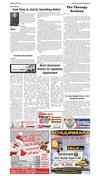
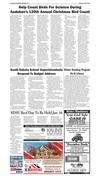
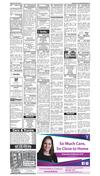
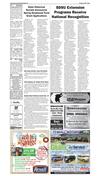

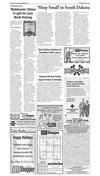
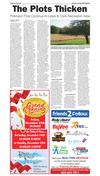
 Previous Page
Previous Page




